“The postman wants an autograph. The cab driver wants a picture. The waitress wants a handshake. Everyone wants a piece of you.” John Lennon
Showing posts with label Lepa Brena nema problema. Show all posts
Showing posts with label Lepa Brena nema problema. Show all posts
Tuesday, March 27, 2012
Succes 2012: Lepa Brena, famous bosniak pop-folk singer
Fahreta Jahić Živojinović (born 20 October 1960) is a Bosniak pop-folk singer, better known by her stage name Lepa Brena.
Lepa Brena was born as Fahreta Jahić to a Bosniak family in Tuzla in 1960, but grew up in Brčko. She was the third-born child of Abid Jahić (1928-2010) and Ifeta Jahić. She has a sister Faketa and an older brother named Faruk
In 1980, she started singing with the band Slatki Greh. She subsequently moved to Novi Sad and then to Belgrade. Brena started to sing in hotel TURIST in Backa Palanka. She released her first album Čačak, Čačak in 1982. She is arguably the most popular singer of the former Yugoslavia, and a top-selling female record artist with more than thirty million records sold.
Beside her career as a singer, Lepa Brena is one of the founders of Grand Slam Group and Grand Production.
Fahreta's nickname "Brena" was given to her by her gym teacher. Later on, Serbian showman Minimax added "Lepa" (beautiful), creating the stage name "Lepa Brena".
Lepa Brena's career can be divided into two main periods:
* Performance with the band Slatki Greh ("sweet sin")
* Solo career
Lepa Brena joined Slatki Greh in 1981 when the group's original singer Spasa left the band because of her marriage. Saša Popović, the band's frontman, was initially opposed to the idea that Lepa Brena should be the band's new singer, but later changed his opinion. Their first performance was in Bačka Palanka on 6 May 1980.
Her first album Čačak, Čačak was written mostly by Milutin Popović-Zahar, and the career-manager was Vladimir Cvetković. That same year Lepa Brena and Slatki Greh appeared in the first part of Yugoslavian classic comedy Tesna koža (translation: Tight Skin), which raised their profile and brought them almost instant popularity.
The second album Mile voli disko, was released in 1983. Best known songs from that album were "Mile voli disko", "Duge noge" and "Dama iz Londona". The album's main writer was Milutin Popović-Zahar.
In 1983, Lepa Brena ended her collaboration with Milutin Popović-Zahar and Vladimir Cvetković. That year Lepa Brena and Slatki Greh participated in Jugovizija (Yugoslav selection for the Eurovision Song Contest) with the song "Sitnije, Cile, sitnije". Her appearance caused confusion among the audience, since Jugovizija was considered exclusively reserved for pop singers. Although they did not qualify for the prestigious European competition, Lepa Brena and Slatki Greh won the contest, gaining even more popularity.
The following year, Lepa Brena and Slatki Greh started a cooperation with a new manager Raka Đokić. "Bato, bato", her third album, was released the same year. A new provocative image was accompanied by a new musical style, different from the one fostered by Popović. Popular pub called "dvojka" has been replaced by pop melodies and more provocative lyrics. The same year, Lepa Brena held a concert in neighboring Romania, at the stadium in Timisoara to an audience of 65,000. It was the first successful concert of a Yugoslav singer outside their home country.
Lepa Brena's next three albums, Pile moje in 1985 and Voli me, voli and Uske pantalone in 1986 would propel her to the throne of the Yugoslav music scene.
Along with these albums, Lepa Brena established a cooperation with Yugoslav folk star Miroslav Ilić and recorded a romantic duet "Jedan dan života", and the song "Živela Jugoslavija", which was received with a mixed response. The latter song was in line with Lepa Brena's only official political stance: an uncompromising support of a united Yugoslavia, with her becoming a symbol of this view.
By the end of 1986, Lepa Brena has already become the most popular public figure in Yugoslavia and strengthened the position of undisputed sex symbol. Later that year, her manager Raka Đokić came up with the idea that her next studio album should be followed by a movie in which would Lepa Brena should play a major role. This idea was successfully implemented in 1987 when the motion picture Hajde da se volimo was filmed. Many then-popular Yugoslav actors co-starred in the film, including Dragomir Gidra Bojanić, Milutin Karadžić, Velimir Bata Živojinović, Milan Štrljić etc.
Based on the success of the original, two sequels were produced for Hajde da se volimo. Hajde da se volimo 2 (1989) was followed by the studio album Četiri godine, and Hajde da se volimo 3 (1991) followed by album Boli me uvo za sve in 1990.
In the turbulent years of the late 1980s and early 1990s, Lepa Brena held more than three-hundred and fifty concerts yearly, and would often hold two concerts in one day. Lepa Brena set a record by holding thirty-one concerts day after day at Dom Sindikata, and seventeen concerts day after day at the Sava Center. In the late 1990s Brena held a concert at Levski stadium in Sofia (Bulgaria), in front of one hundred thousand people.
Lepa Brena and Slatki Greh recorded their second-to-last album together: Zaljubiška, in 1991.
In 1994, after a three-year break, Lepa Brena recorded her first solo album Ja nemam drugi dom, and held a famous "Concert in the Rain" at Tašmajdan stadium which was attended by 35,000 people. The next year, she recorded a couple more solo albums: Kazna Božija (1995) and Luda za tobom (1996).
[edit] Return to music
After eight years of absence from making music, Lepa Brena returned in 2008 with a studio album, "Uđi slobodno". The album contained 10 new songs, nine of which were written by Brena's old song-writer Marina Tucaković and Aleksandar Milić Mili. She then released her sixteenth album, "Zacarani Krug", in 2011. Both albums were major successes
Subscribe to:
Comments (Atom)




